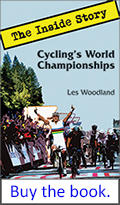

Briek Schotte:
The Last of the Flandrians
by Owen Mulholland
A few notes about Briek Schotte's career

Les Woodland's book Cycling's World Championships: The Inside Story is available as an audiobook here. For the print and Kindle eBook versions, just click on the Amazon link on the right.
Owen Mulholland wrote this just before the 1986 World Championships that were held at Colorado Springs:
The World professional Road Championship usually lasts about eight hours. That's a long time in the saddle, even for a top pro. It's not surprising that the first two-thirds of the race tends to be a promenade. Or so those miles appear to the casually interested spectator as the public address system blares "peloton groupé" lap after lap. Domestiques do most of the pace setting, maintaining a rolling tempo that discourages attacks and protects the leaders.
USCF officials, fearful that the unequal effect of these prelude miles will be beyond discernment for the uninitiated crowd at the upcoming Colorado World's, plan to lay on all sorts of roadside entertainment. If, as rumored, they install big screen TVs every mile then the fans may have a chance to appreciate the subtleties of this lengthy introduction.
The peloton may indeed be groupé but after a while many are hurting. Motorcycle cameramen can reveal the quiet stress: grimaces on the hills, fixed gazes, arrhythmic pedaling and a helpful push from a teammate. By the time the "real racing" begins many are ready for the guillotine. The vice that has been tightening for hours deadens legs so they can't take sharp accelerations. Soon a steady stream of riders is on the way to the showers.
Everyone knows this standard scenario, but few have been able to alter the script. As a rule, early attacks are suicide. Usually only one World's a decade is an exception. All are memorable.
Take 1948, Valkenburg, Holland (also used in 1979). Since the resumption of racing after World War II, two Italians, Gino Bartali and Fausto Coppi, had dominated the European cycling scene. Finishing close behind these two constituted lofty ambitions for their adversaries.
On a long list of outsiders you might have found the name of Briek Schotte. He was one of many young Flandrians who had attempted to escape the grinding poverty of the pre-war years by hitching his hopes to two wheels. Today, in the U.S., we can hardly imagine the sacrifices involved. Briek was not unusual in being a full time factory worker at age 17. He gave all his money to his mother and rode on patched and re-patched sew-ups. Every morning he arose at 3:30 in order to train before work. Anyone in the least acquainted with the road and weather conditions in Belgium can appreciate the character of this young man.

Briek Schotte
He had just crawled up to the bottom rung of the professional ladder late in 1939, had taken the lead in a small race in western France, when war was declared. Six years were to pass before he could restart his career.
By 1948 he had collected a few victories and established himself as one of the better Belgians. No one expected a world championship victory from him, and until the morning of that race, neither did he. But as he sat at the table with his teammates, each man quietly preparing for the battle ahead, Schotte knew he felt exceptionally good.
"In the morning I felt that everything would go well and I had complete confidence. I often recall that race. There were more than 100,000 spectators packed around the relatively short six-mile circuit. We had to climb the Cauberg, a wicked hill, 26 times, with the finish at the top.
"I had decided to make the race as hard as possible. The opportunity came on the third lap when four men got away and I joined them. The rest must have been saying to themselves, 'They're crazy to go so early. There are still 150 miles to go.'"
The group blended well and carved out a three-minute lead until three more men joined them at the halfway point. Briek continued his narrative, "I was concerned that the understanding in our group should not be broken so I decided to push a little harder on the pedals." Four men dropped.
Six laps later a distant rumble could be heard. It was the roar of the crowd on the other side of the course. Dutch hero, Gerrit Schulte, was making his do-or-die counter-attack. Bartali and Coppi had both quit rather than help each other in the chase so Schulte knew it was up to him to close the eight-minute gap. Even with the verbal support it was a monumental effort to make up such a deficit. And Briek knew it.
"Very fortunately for me he caught us just before the climb up the Cauberg," Briek said. "I realized I must attack immediately; it was essential not to give him time to recover. In a sprint he could beat us all. I could see he was cooked and by the top of the Cauberg only two were with me. One I dumped on the next lap, and the other, Apo Lazaridès, a French climbing specialist of the time, could only hang on.
"For 25 miles I towed Apo, but was never afraid of him. I easily won the sprint. Yes, that race is my happiest memory, for never have I been stronger. I have won many races, but none like that, in the lead and attacking for more than 125 miles. Only ten others finished. What a day!"
The course at Colorado Springs offers plenty of opportunity for anyone with the Briek Schotte spirit. Not since 1968 has such audacity succeeded. Maybe it's about time.
A few notes about Albéric "Briek" Schotte:
Schotte won the World Road Championship twice, in Valkenburg in 1948, as Owen described above. His second rainbow jersey was won in Moorslede, Belgium in 1950, leaving second-place Theo Middlekamp a minute behind. He won the Tour of Flanders, Paris–Brussels and Paris–Tours each twice. He also won the Tour of Luxembourg and Gent–Wevelgem. Schotte could handle the big stage races, coming in second to Gino Bartali in the 1948 Tour de France. He was one of the greatest riders of the postwar era.







